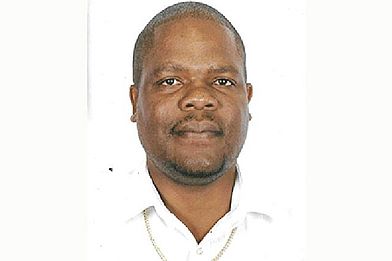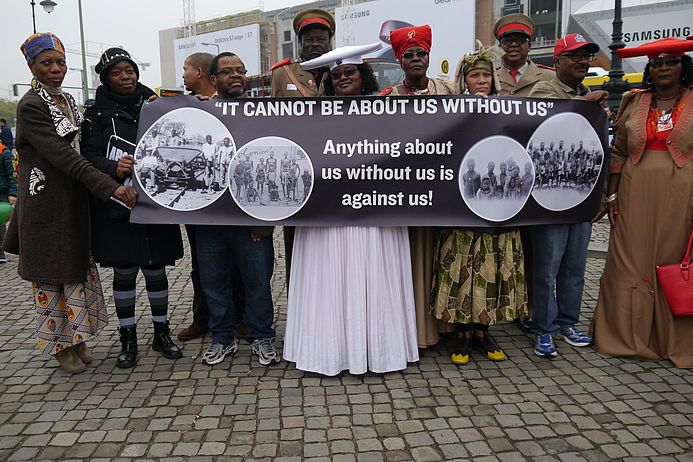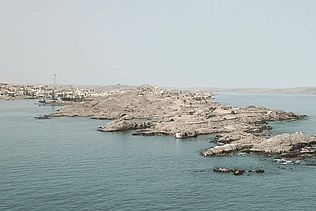
For decades, descendants of victims who considers themselves heirs and equally victims campaigned for recognition and full redress for the German genocide against Ovaherero and Nama people in present-day Namibia. Mandated by the extermination order of the Supreme Army Command, German colonial troops hunted down and murdered up to 100.000 Ovaherero and Nama from 1904 to 1908 and imprisoned survivors in concentration camps where the annihilation campaign continued. In total, about 80% of the entire Ovaherero people were killed during this period. In respect of the Nama, 50% of their people perished.
Despite the scale and systematic nature of the crimes, it took until 2015 for the German government, in spite of unrelenting calls by the two respective communities, to agree to enter into bilateral talks with the Namibian government to the exclusion of the Ovaherero and Nama communities. It was not until 2021 that the German Foreign Office announced an agreement with the Namibian government under which Germany is to offer Namibia project financing towards what the agreement calls "reconstruction and development." However, the so-called "Reconciliation Agreement" does not do justice to the demands of the Ovaherero and Nama. Their representatives do not recognize the agreement and continue their struggle for an appropriate confrontation with the crimes as recognized by international law.
During the conference "Rethinking Africa 2022" in October, key actors from Namibian society came to Frankfurt to discuss what a truly just approach would mean for the German-Namibian relations. The following interview with Nandiuasora Mazeingo, chairman of the Ovaherero Genocide Foundation, followed on the failures at the core of the agreement, the continuation of colonial conditions, but also on the possibilities of a common future.
medico: Why do the representatives of the Ovaherero and Nama not recognize the so-called "reconciliation agreement" of 2021?
Nandiuasora Mazeingo: The struggle of Ovaherero and Nama nations goes back more than 100 years and because of the genocidal campaign at the turn of the last century, our struggle today is transnational and multi-territorial with the pursuits for justice alive as it was more than 100 years back. Perhaps with more vigour and determination today than before purporting to be working for our interest and in our representation but without a mandate and thus our participation, Namibian government and its German counterpart delivered a Joint Agreement we reject for both the flawed process that delivered but also the inadequacies of its content in terms of scope, reach and intended application inter alia. I our view it remains an agreement solves nothing.
We as a people lost our two respective countries and literally everything as a result of the genocide and that to us is not just history but present-day reality. We continue to live it daily. The first main problem with the agreement is that we are not involved in the negotiations. The UN Genocide Convention of 1948 clearly states that genocide is not a crime against a state, but a crime against a specific group of people, for example tribes and ethnic groups. Despite this definition, our voices are not heard, but silenced by being excluded from the process. Namibia did not exist when the crimes were committed and the government of today is largely composed of people who do not belong to our groups as the main targeted nations. Yet this modern state ascribes to itself the sole authority to define justice for us but without ever having asked for a mandate from us to do so. Therefore, the "reconciliation agreement" fails to meet perhaps the most important formal requirement: The definition of justice by victims themselves so as to ensure that their justice is delivered in their terms and that importantly that assurances for non-recurrence are transmitted directly to them and not through a proxy. The joint agreement is thus not ours and principally not about us.
Shouldn't it also be possible for Germany to conduct this process both at the state level and in direct talks with the victims' descendants?
That's the way it should be and that is the spirit of the 2006 Namibian Parliamentary Motion on Genocide. A tripartite arrangement that sees both state actors talking to each other but essentially also us as victims having a direct voice in the talks. Let's think about reparations in the context of the Shoah; here the German state - in order to be accepted back into the club of "Western civilized states" - talked to the 23 Jewish committees that came together in the Jewish Claims Conference. Because with the formation of the state of Israel, only some Jews choose Israel as their home and were thus Israeli citizens the government there could affect representation over, the others outside Israel could not be represented by Israel but themselves through platforms and or actors/ proxies of their choosing. Similar conditions exists in our case a resolution of the Namibian Parliament in 2006 calls for a tripartite process where in there is to direct talks between the two states, German and Namibia, with the Namibian state explicitly assigned the role of mediator but with a clear direct role for targeted communities, some of whom are not citizens of Namibia and thus cannot effectively be represented by the government of Namibia. Therefore, in our view, the German experience with the negotiations of the Shoah provides a fitting template and we should not be wasting time trying to reinvent the wheel. In case, without the current noise of our non-eligibility to speak direct to Germany on the basis that we are a no state actor, the Konrad Adenauer German government signed two protocols: the first was signed with the State of Israel for the interest of Jews who are Israeli, the second with the Jewish Claims Conference who mostly were represented by non-state entities and lived outside Israeli, therefore outside the reach of that state’s representation.
Did the German government try to start a conversation with you?
Last year, the German President Frank-Walter Steinmeier we were told had plans to travel to Namibia to inter alia apologize to the Namibian Parliament. In response, we said even if we also identify ourselves as Namibians today, we as Ovaherero and Nama nations have our own leaderships which have existed for over a 100 years and for the greatest part of our struggle have carried it single-handedly and so how they were suddenly be sidestepped by an abstract concept such a Parliament come across as more than condescending and frankly insulting.
For in our view, anyone who really wants to address past injustices committed against a people with a specific identity and residence is best advised to tease out such people and direct his or her heartfelt apology to that people without equivocation and qualms and. An apology exclusively before a Namibia Parliament which basically is just abstract idea of representation is to us greatest insult and sacrilege. And it to us reflects the old racist attitude of dismissing black people as savages easily disposable. Be in their view, even an apology for us is rather transmitted through another party to us, became we are not worthy of self-representation and acceptance or rejection of what’s directed at us.
The same thing happened this year when Sima Luipert, my colleague from the Nama side, came to Berlin. The Foreign Minister Annalena Baerbock refused to receive us. For a long time, we considered the Greens to be friendly to our cause, which is why we were very optimistic when they were elected into government in 2021. We thought that now was an opportunity for us engage seriously with German leaders. But to be honest, we were soon reminded of the well-known saying: "Once in power, politicians are all the same." And now they don't even want to meet us. This is very disappointing, but perhaps not particularly surprising.
What do you criticize about the content of the "reconciliation agreement"?
The 2006 parliamentary resolution not only calls for tripartite talks. It also demands that Germany recognizes her genocide against us as crime under international law and admit her guilt with all its culpabilities. For genocide is a legal concept with legal possibilities, consequences and penalties. It is not merely a political or moral concept. In the agreement, Germany refuses to admit its guilt and wriggles around a clear admission. It stated that it was genocide only from today's perspective because the victims were not yet considered human beings at the time. It frankly we were savages who belonged to no recognized states and thus a people with no rights civilized people only could claim. This basically underwrites the argument General von Trotha, commander of the German colonial troops, employed in legitimizing the murder of our people: the racist argument that the others were "savages", that they did not deserve their land and that we as a "superior race" had to take it.
Naturally because Germany denies guilt for the crime of genocide, the Namibia-German discussion gravitated away from reparations which intrinsically is linked to genocide punishment and prevention to mere questions of development aid that are normal components of state bilateral relations.
And this then spelled a dead end for us. Because we are convinced that nothing can rebuilt on something that is structurally and fundamentally flawed. We have to talk about reparations, which are a punishment for a crime and have nothing to do with the good will of voluntary aid.
And compromises like this are bounty in our history and they are the reason for many of the problems we still face today. In 1982, on the way to our independence, Germany, France, the United Kingdom, Canada and the United States enshrined white private property rights in the Namibian constitution. Our independence was bought by ceding the right to the land stolen from us. Today we are stuck unable to move forward on the land redress question. So what would we gain by continuing with agreements that would not solve any of the problems we have today, as we have for over 100 years?
What does it mean that the descendants of the German settlers still own much of the land that was stolen from your people?
Today, many Ovaherero and Nama live in poverty because they have been robbed of their land and other cultural and spiritual possessions. We, the Ovaherero, have always been cattle farmers, and in order to farm cattle you need land. After the genocide, our people were rounded up and put in concentration camps. And when the concentration camps were closed, people were set free but sold off as slaves to the Germans who occupied our land and stole our cattle. This was not simply at the hands of individuals acting arbitrary but based on deliberate state policy imposed on us by Germany after the war to dispossessed, misplace and lock us into intergenerational poverty and subjugation.
With little to no payment for their labour, the Ovaherero were still able to build up a small herd of cattle over time. When they were released from the white farms, they were relegated to the so-called native reserves ("indigenous reservations"): Small pieces of land on which the Ovaherero lives to this day. Meanwhile, most of their land is still inhabited by whites of European descent. And in fact, I have heard that most of them still continues to enjoy German citizenship privileges, how I don´t know as I know that Namibia expressly bars dual citizenship. Some of them own huge tracts of land, stretching thousands of acres that are unoccupied most of the year, while the Black majority is crammed into native reserves. The problem of landlessness clearly demonstrates a continuity of colonial attitudes and crimes.
The German extermination order is basically still intact today.
The conditions of war have never formally ceased to exist. The extermination order was promulgated to Kickstart the first phase of hunting down and militarily killing our people - who were already unarmed at that time and could just about feed on wild fruits. The second phase consisted of concentration camps where the incarcerated were worked to death. All of this has led to the current state of poverty, landlessness and displacement. What is happening today is a system of continued of colonialization, exploitation and subjugation, not least oppression. For example, when Germany denies us the right to speak for ourselves, it remains a kind of annihilation for us. Because it expresses that in their eyes we are a people that does not exist.
How do people in Namibia feel about their situation? Is there still anger?
There is a lot of anger. Especially among our youth in the native reserves, because they don't even have land to start their own small farms, they have no prospects. At the same time, they are surrounded by vast fenced-off tracts of land, most of whose white occupants don't even live on but just fenced off because of greed and lack of humanity for others. They keep wild animals there as an attraction for white vacationers who come here during the winter months for their safari trips. So there is a lot of anger. Often, out of frustration and protest, these fences are often cut open to let our animals graze on the land of our ancestors. The younger generation is seething with anger spurred by the naked truth that right behind the high ugly fences is their land and inheritance. In our view, Germany seeks to protect and strengthen the economic interests of the few white occupiers of in our country, who largely disregard our history and continues to deny it.
What future prospects do you see for your struggle? And what role should German society play in this process?
On the one hand, we would like the descendants of the white settlers to sit down at the table with us and engage in conversation. Because despite our different histories, we recognize that they were too born in Namibia and that we have a common future as Namibians. Ultimately, the agreement has to be about building bridges between our peoples, it has to be about us coming together, healing and forgiving, but not forgetting. So it is not a process between politicians, but a process between societies and individuals.
On the other hand, German society must understand that the so-called "reconciliation agreement" is forced upon us by their representatives. Their dirty work is done in the name of all of German society. So if you keep silent, you are agreeing with what they are doing in their name and so are equally guilty of the culpabilities that arises We have lost everything and there is no way for us to forget, forgive and move on unless there is a sincere process to ensure that justice is served without compromising. If we look at the big picture, this struggle should ultimately be about global cooperation, peace and justice.
If we succeed in this, other former colonial powers may follow the path of Germany and the Ovaherero and Nama. It is a global struggle in which cooperation, interdependence and the indivisibility of the world are up for negotiation. It is a struggle for all of us.
The interview was conducted by Julia Manek. Translation and editing by Moritz Köhler


